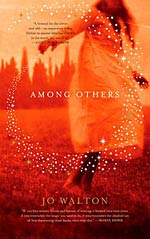
![]() everythinginstatic
everythinginstatic
2/19/2017
![]()
The Phurnacite factory in Abercwmboi killed all the trees for two miles around.
And with that line, you're pulled straight into a story so wonderful, so delightfully magical that you'll find yourself wanting to stay behind at the final page. It's full of a quiet sort of magic, the plausibly deniable kind, with fairies and witches and most of all, with books. It's a novel for and about readers of speculative fiction, for bookworms and nerds and oddballs, for those who were ever shunned for anything in their lives -- in this case Morwenna is Welsh and disabled and that immediately means that the girls in her new school bully her relentlessly. But Mor could deal with it, she really could, except her twin sister Morgana is dead and it's due to her mother's meddling in magic. And she's had to leave Wales, the place she truly considers home, to go and live with her father, the father who abandoned her when she was an infant. From there it's boarding school in England and the feeling that she will never truly belong, but that she could just about cope, as long as she has her books.
It doesn't matter. I have books, new books, and I can bear anything as long as there are books.
Among Others is a perfect book for book lovers and I found myself completely enamoured with Mor. She is acerbic and witty, but also quite clever, in a completely unashamed sort of way. I liked the way she dealt with the challenges ahead for someone her age, I liked her voice in her diary entries, the way she examines situations and people. The magic system is subtle and easy to deny, something that Mor does herself frequently. If anything, everything in the novel becomes questionable, as she is also an unreliable narrator? How much is true and how much is fake? Is her mother truly a powerful witch or just a madwoman? How much of what happens in the book is related to the plots of all the books that Mor reads and how much did I lose as a reader because I was only familiar with some? Now Walton helpfully has created a bibliography and posted it on her Livejournal, so I can handily reference it now and be able to see just how much of the classics of speculative fiction I've actually read. From a brief perusal of the list, not that many. So that's definitely something to work towards, particularly as I share Mor's love of libraries and loans. But more than anything this is a love letter to classic 1960s and 1970s SF/F, it's a love letter to books in general and the power of stories. When Mor loses herself in fiction just to forget her current situation, you want to do the same with her. By the end, I was dragging out the story, because I didn't want to leave Mor behind, I didn't want to finish her journey, I wanted us to keep going and keep reading, I wanted to know what she would make of the fantasy and sci-fi boom of the 2000s and onwards. The prose is simple, but lyrical and works very well at portraying the feel of the English scenery, the dreary school food and the sheer joy of the book club meetings. Walton does very well at creating believable characters and situations, and even tertiary characters feel real, like they could actually exist. By putting everything in a diary format, it's easy for Mor to switch between events in the near past and those in the further past, as she tries to come to terms with what actually happened. Overall, this is a superb novel and it's made me very curious about the rest of Walton's novels, particularly My Real Children. I want to return to the worlds she imagines and see what other tricks she has up her sleeve.